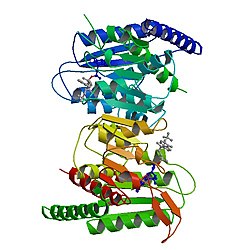Methylenetetrahydrofolate dehydrogenase, cyclohydrolase and formyltetrahydrofolate synthetase 1 (MTHFD1) is a gene located in humans on chromosome 14 [4] that encodes a protein, C-1-tetrahydrofolate synthase, cytoplasmic also known as C1-THF synthase, with three distinct enzymatic activities. [5] [6] [7]







